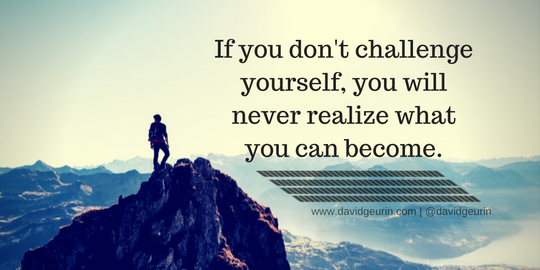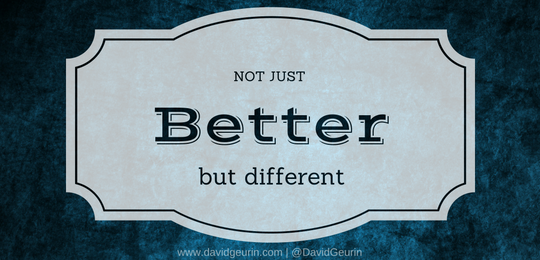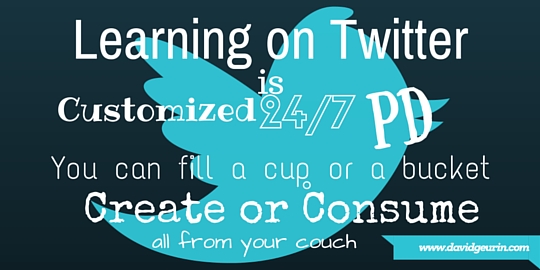I gave an assignment to one of the graduate classes I teach to consider a technology purchase a school has made recently. Was there a good return on the investment? Was the total cost of ownership considered? Was there a clear purpose for obtaining the technology in the first place? Students then explore these questions by talking with a principal or other decision-maker about the process of acquiring the new technology in their school.
One of my students shared about how their school had purchased a software program to help with a broad array of learning objectives. I am paraphrasing below the response she shared from the school leader she interviewed.
We don't really spend much on technology. We purchased the software to help with mastery of content, but our data didn't show it was effective. We bought it to increase student achievement across the curriculum. It was fun, engaging, and relevant for students, but we make our spending choices based on how it impacts our data. We are data-driven.Now I certainly realize there are limited resources in every school, and honestly this software sounds like test-prep to me, and there are far more valuable, authentic ways to use technology in my view. But I was also puzzled by the idea that a method or strategy could increase engagement, be fun and relevant, and yet if it doesn't show an measurable impact in data, it's not valuable or worthwhile. That seems to be the line of thinking.
We've spent a significant amount of money in our district on Chromebooks as part of our digital learning initiative. And I'm thankful for the support of our district to provide this learning tool for students. But there have been questions raised about how we know this digital transformation is resulting in learning gains. What data proves that this is working?
And I can understand when a school is spending a lot of money, we want to see evidence that it's money well-spent. But that evidence may not be quantifiable. I believe providing a Chromebook for students to use for learning is a necessary part of preparing students as learners for life in a world that is increasingly digital. But I don't think it's possible with any degree of validity or reliability to show direct links between this tool and a learning outcome.
What if we applied the same type of thinking to other aspects of school?
Can you show me that your school library has a measurable impact on student achievement?
Could you please show us that your textbook has a measurable impact on student achievement?
What data can you present to demonstrate that music, art, career education, or athletics has a measurable impact on student achievement?
We spend significantly on all of these in our district because we think they are incredibly important (the importance of the textbook might be up for debate). And we know they are important not because we have data measures that tell us so. But we do have plenty of evidence that demonstrates their impact. We know they are good for kids and good for learning.
When I hear the term data-driven, I admit it makes me cringe just a little. I always try to view learning through the lens of being a dad. I never want the complexity of my child's learning reduced to a number. It is dehumanizing. Is it inevitable in the current system? Yes, it probably is. College entrance emphasizes the ACT score for instance. But I know there are many brilliant students who are not accurately represented as learners based on an ACT score.
Instead of data-driven, shouldn't we first be student-driven. George Couros has written about this idea and shared it in his presentations. People are always more important than any metric or number. When we reduce a person's abilities to a number we risk putting limits on their potential and capabilities. NBA superstar Stephen Curry didn't allow the numbers to keep him from greatness. Coming out of college he was considered by scouts to be undersized with athleticism far below the NBA standard. He couldn't run as fast or jump as high as the typical elite athletes in the league. From a data-driven perspective, at best he would be a marginal contributor on an NBA team. He would be a role player.
But what the NBA scouts didn't account for was his commitment to excellence, his incredible work ethic, his passion and instincts for the game. He turned the numbers upside down. He used creativity and risk-taking to gain the upper hand on superior athletes. His success reminds me of this Jon Gordon quote:
The world will try to measure you by scores and numbers, but they'll never be able to measure the power of your desire and size of your heart.When we are student-driven, we make decisions that recognize a student has potential far beyond what the numbers might indicate. We don't make our decisions based on numbers alone. We make decisions based on good thinking that includes what we know about human potential and what students need to succeed in a complex, uncertain world.
So even if we can't quantify the impact of a digital device, that doesn't mean it isn't valuable to learning. Our world is increasingly digital and being an effective learner means being an effective digital learner too. Being student-driven also means being future-driven, especially in today's rapidly changing world. We are doing the right thing for our students when we do what's best for them in the long run, not just to raise a score in the short term.
Later this summer, I'm releasing my new book, Future Driven: Will Your Students Thrive In An Unpredictable World? It will empower you to crush the status quo, create authentic learning, and unleash your passion to help students succeed in a time of unprecedented change. In hockey, the puck is traveling at speeds up to 100 mph. And that's why players say you don't skate where the puck is, you skate where it is going. The same is true for our students and schools. We must be student-driven and future-driven to create learning that will serve students well in our modern world. The puck is moving fast, and we have to help our students keep up.
In the coming weeks, I'll share more details about my book release and give my blog readers an in-depth preview. I've poured all my energy, effort, and enthusiasm into this project, and I'm excited to share it with you. It truly is a passion-project. And I think you'll love the message and want to add it to your professional library.
You might also want to check out this post from George Couros and this one from Lisa Westman both with strong ideas regarding being student-driven.
Question: What are your thoughts on being student-driven and future-driven? What role does data play? I want to hear from you. Leave a comment below or respond on Facebook or Twitter.















